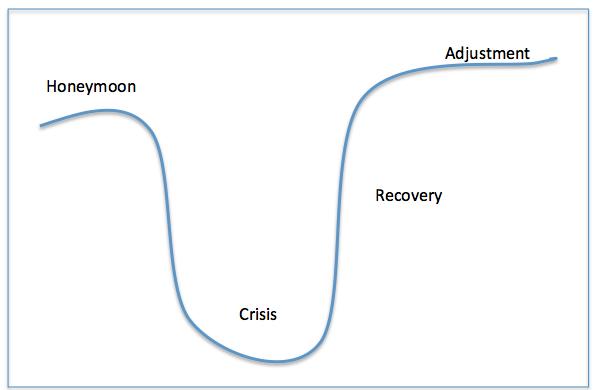Cultural Adjustment
Merced is one of the more culturally diverse cities across the U.S. where you will find students and visitors from different origins, ethnicities and cultures from all around the world. Most people who move to a place where people’s language, behavior, ideas and ways of thinking are different will require some time to adjust to their new environment. Taking every opportunity to learn about and experience your new environment can ease the process of cultural adjustment.
Cultural Adaptation
Adapting to a new environment takes time and the pace of transition varies from person to person. The typical pattern of cultural adjustment often consists of distinct phases: Honeymoon, Crisis, Recovery, and Adjustment. Notice that this cycle is then repeated upon re-entry to one's home country or culture of origin. The effect these phases have on one's mood is illustrated in this "w-curve" figure:

The Honeymoon Phase
This phase is best described by feelings of excitement, optimism and wonder often experienced when you enter into a new environment or culture. While differences are observed, students are more likely to focus on the positive aspects of the new environment.
The Crisis Phase
This what is often termed as "culture shock." Culture shock has been defined in different ways by many social scientists. In general, it is a term used to describe the anxiety and feelings (of surprise, disorientation, confusion, etc.) felt when people have to operate within an entirely different cultural or social environment. It grows out of the difficulties in assimilating the new culture, causing difficulty in knowing what is appropriate and what is not. Often this is combined with strong disgust (moral or aesthetical) about certain aspects of the new or different culture. Culture shock does not necessarily occur suddenly, but may gradually begin to affect a person's moods over time. The length of time a person experiences culture shock depends on how long they stay in the new environment as well as their level of self-awareness.
Symptoms of Culture Shock
Culture shock manifests itself in different forms with different people but some symptoms can be:
- changes in eating habits and sleeping habits
- acute homesickness; calling home much more often than usual
- being hostile/complaining all the time about the host country/culture
- irritability, sadness, depression
- frequent frustration; being easily angered
- self doubts; sense of failure
- recurrent illness
- withdrawing from friends or other people and/or activities
The Recovery and Adjustment Phases
Recovering from culture shock is handled differently by everyone-we each have our unique circumstances, background, strengths and weaknesses that need to be taken into consideration. With time and patience, we can experience positive effects of culture shock, like increasing self-confidence, improved self-motivation and cultural sensitivity. Adjustments As you gradually begin to feel more comfortable in and adjusting to the new environment, you will feel more like expanding your social networks and exploring new ideas. You will feel increasingly flexible and objective about your experience, learning to accept and perhaps practice parts of the new culture, while holding onto your own cultural traditions.
Suggestions for easing the transition:
- Realize that what you are going through is normal. Remember that the unpleasant feelings are temporary, natural and common to any transition that a person makes during their life. Be patient and give yourself time to work through the process.
- Keep in touch with your home country. Read newspapers from home, international magazines, etc. Watch international television channels or surf the internet. Call home regularly. Have familiar things around you that have personal meaning, such as photographs or ornaments. Find a supplier of familiar foods or visit restaurants that are similar to your home cuisine.
- Take care of yourself. Eat well, exercise, and get enough sleep!
- Talk to someone. Find friends who are going through a similar process, call your family back home, or see a counselor. The University Health Services has trained counselors from many cultural backgrounds who can help you through the difficult parts of cultural adaptation. In the U.S. it is very common to talk with a counselor about problems or difficulties. Take advantage of the resources available to you at the university.
- Have fun and relax! Become a member of the I-House. Join student groups. Get out of your room and volunteer to help others. Take up a new sport at the RSF. Participate in activities, clubs and student organizations of interest to you.
- Improve your English skills. Cultural adaptation is greatly enhanced by perfecting your English skills. Not being able to clearly communicate can create isolation and loneliness. Make a point to join activities that give you the opportunity to share in conversation and express your identity.

